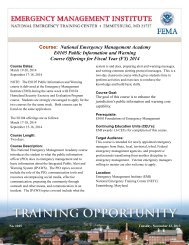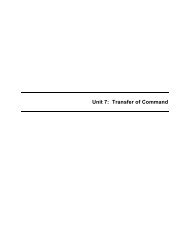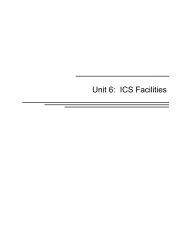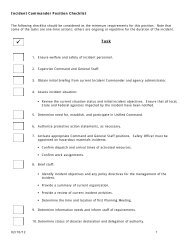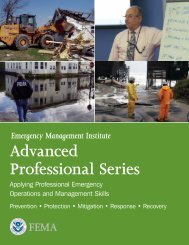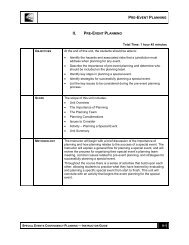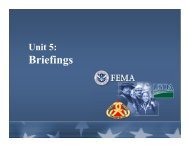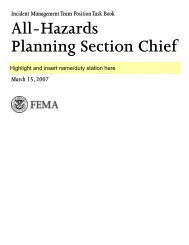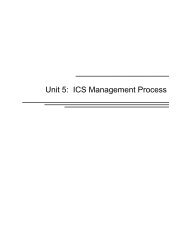enrollment for emi courses - Emergency Management Institute ...
enrollment for emi courses - Emergency Management Institute ...
enrollment for emi courses - Emergency Management Institute ...
You also want an ePaper? Increase the reach of your titles
YUMPU automatically turns print PDFs into web optimized ePapers that Google loves.
statE/lOcal/trIbal fIElD<br />
cOursEs—prEparEDnEss<br />
& tEcHnOlOgy<br />
EmE r g E n c y ma n a g E m E n t In s t I t u t E • 2010-2011 • ca t a l o g of co u r s E s<br />
<strong>for</strong> the 100-, 200-, 300-, and 400-level ICS <strong>courses</strong>.<br />
The partner agencies and departments recognize<br />
these <strong>courses</strong> as equivalent.<br />
ICS 100- and 200-level <strong>courses</strong> are available in both<br />
a web-based Independent Study <strong>for</strong>mat and as a<br />
classroom-delivered course. These entry-level ICS<br />
<strong>courses</strong> are suitable <strong>for</strong> persons working in an ICS<br />
environment. ICS-100 and 200 are located on EMI’s<br />
Independent Study web site at: www.training.fema.gov.<br />
The 300- and 400-level <strong>courses</strong> are classroombased<br />
multi-discipline or multi-jurisdiction<br />
<strong>courses</strong> intended <strong>for</strong> persons with supervisory<br />
responsibilities, such as the Incident Commander or<br />
Planning Section Chief.<br />
community mass care management<br />
(g108)<br />
This 2-day course is intended to equip emergency<br />
management and voluntary agency personnel with the<br />
knowledge and skills to per<strong>for</strong>m as effective mass care<br />
coordinators in a broad range of disaster situations.<br />
The course covers how to assess and size up mass<br />
care needs; how to plan <strong>for</strong> mass care; recruitment,<br />
training, and exercises <strong>for</strong> mass care personnel; and<br />
actions to take in short-term and long-term mass care<br />
operations (response and recovery).<br />
Selection Criteria: State, Tribal, and local government<br />
emergency management and voluntary agency<br />
personnel who provide mass care assistance.<br />
Incident command system/<br />
<strong>Emergency</strong> Operations center<br />
(Ics/EOc) Interface (g191)<br />
This course works best when delivered to Incident<br />
Command System and <strong>Emergency</strong> Operations Center<br />
personnel from the same community. The course<br />
provides an opportunity <strong>for</strong> participants to begin<br />
developing an ICS/EOC interface <strong>for</strong> their community.<br />
The course reviews ICS and EOC responsibilities and<br />
functions and depends heavily on exercises and group<br />
discussions to <strong>for</strong>mulate the interface.<br />
FEd E r A L Em E r g E N C y mA N A g E m E N T Ag E N C y 88<br />
Selection Criteria: Participants should be teams from a<br />
community’s ICS and EOC personnel.<br />
Prerequisites:<br />
Recommended: IS 100.a, Introduction to the Incident Command<br />
System (ICS), ICS-100; IS 200.a, Incident Command System<br />
(ICS) <strong>for</strong> Single Resources and Initial Action Incidents, ICS-200;<br />
and/or EOC <strong>Management</strong> <strong>courses</strong>.<br />
Course Length: 8 hours<br />
<strong>Emergency</strong> planning and special needs<br />
populations (g197)<br />
This 2½-day course is intended to provide those with<br />
responsibilities <strong>for</strong> providing emergency planning<br />
or care of seniors, people with disabilities, and/or<br />
special needs groups with the skills and knowledge<br />
they will need to prepare <strong>for</strong>, respond to, and recover<br />
from emergency situations.<br />
Selection Criteria: The target audience <strong>for</strong> this course<br />
includes emergency managers, senior first-response<br />
personnel, special needs coordinators, human<br />
services organization personnel, facility planners,<br />
community-based organizational personnel,<br />
advocacy group personnel, elected officials, public<br />
health personnel, and Voluntary Organizations Active<br />
in Disaster (VOAD) personnel.<br />
workshop: amateur radio resources<br />
(g250.6)<br />
This 3- to 4-hour workshop is designed to provide<br />
State and local elected officials, emergency managers,<br />
and other public officials an understanding of<br />
how these volunteer communication groups can<br />
help in supplementing telecommunication and<br />
warning systems.<br />
Selection Criteria: State and local elected officials,<br />
emergency managers, and other public officials.



